牛津译林版(2019)必修 第一册Unit 2 Let's talk teens语法复习课件(共15张PPT)
文档属性
| 名称 | 牛津译林版(2019)必修 第一册Unit 2 Let's talk teens语法复习课件(共15张PPT) | 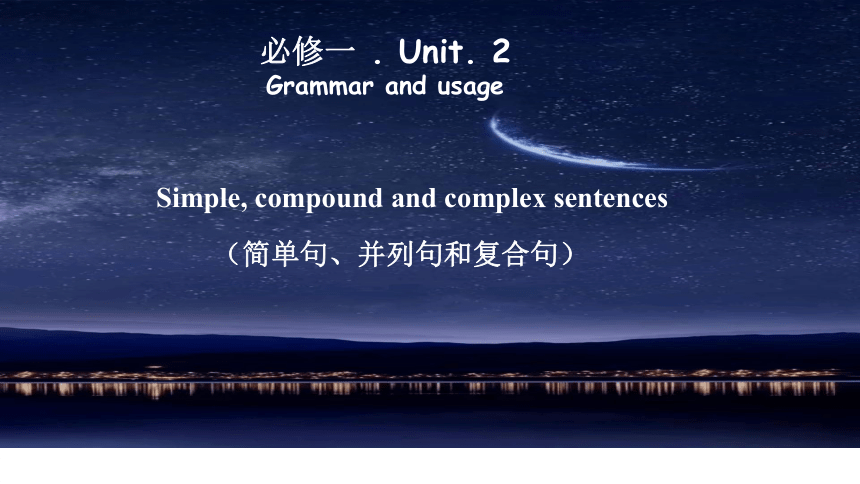 | |
| 格式 | pptx | ||
| 文件大小 | 1.5MB | ||
| 资源类型 | 教案 | ||
| 版本资源 | 牛津译林版(2019) | ||
| 科目 | 英语 | ||
| 更新时间 | 2023-01-02 20:36:00 | ||
图片预览

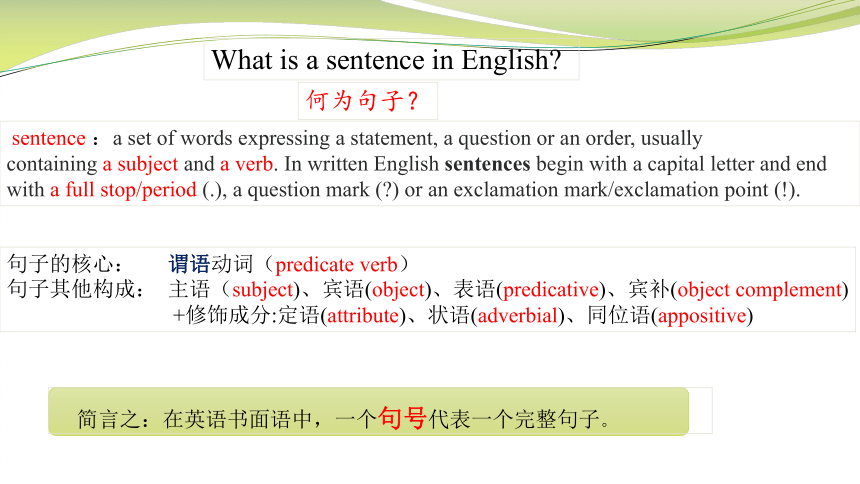
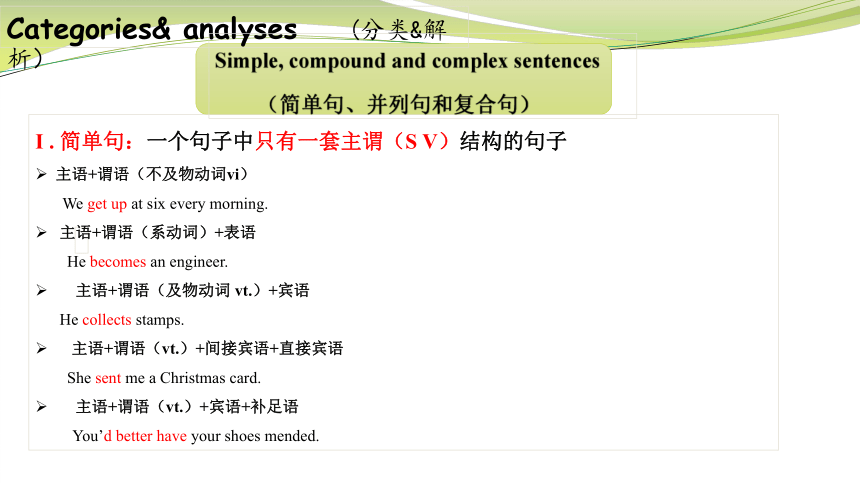
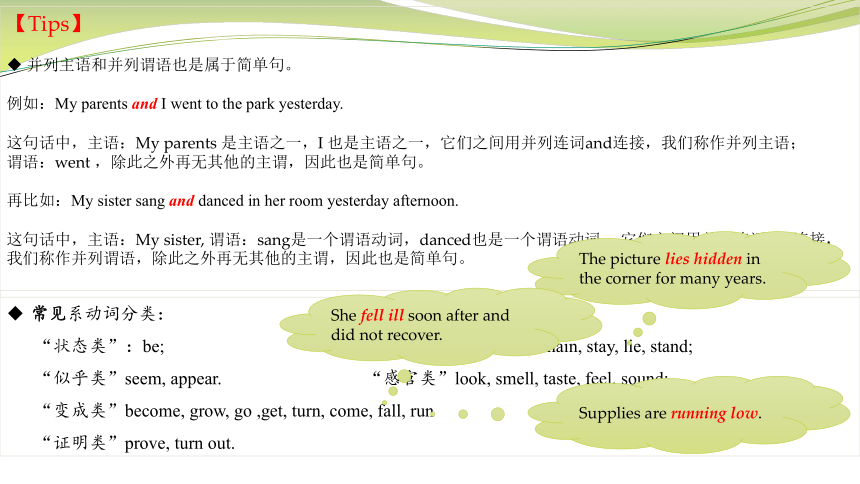
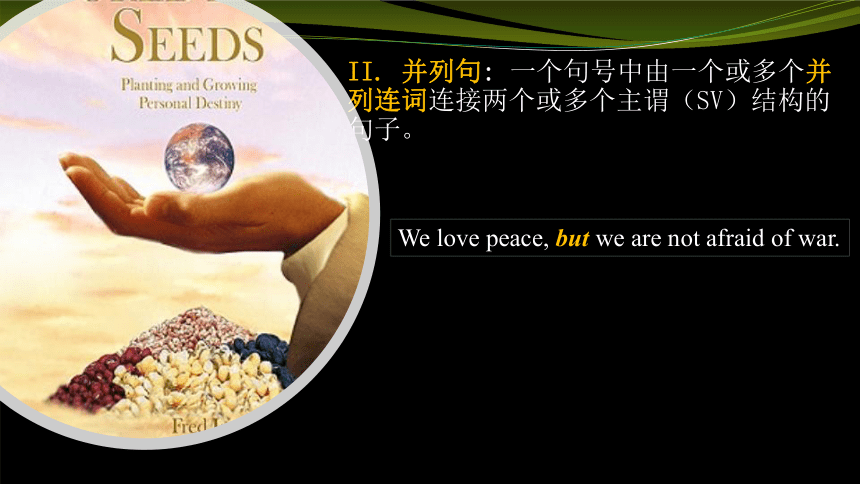


文档简介
(共15张PPT)
必修一 . Unit. 2
Grammar and usage
Simple, compound and complex sentences
(简单句、并列句和复合句)
What is a sentence in English
sentence :a set of words expressing a statement, a question or an order, usually containing a subject and a verb. In written English sentences begin with a capital letter and end with a full stop/period (.), a question mark ( ) or an exclamation mark/exclamation point (!).
何为句子?
简言之:在英语书面语中,一个句号代表一个完整句子。
句子的核心: 谓语动词(predicate verb)
句子其他构成: 主语(subject)、宾语(object)、表语(predicative)、宾补(object complement)
+修饰成分:定语(attribute)、状语(adverbial)、同位语(appositive)
Categories& analyses (分类&解析)
I . 简单句:一个句子中只有一套主谓(S V)结构的句子
主语+谓语(不及物动词vi)
We get up at six every morning.
主语+谓语(系动词)+表语
He becomes an engineer.
主语+谓语(及物动词 vt.)+宾语
He collects stamps.
主语+谓语(vt.)+间接宾语+直接宾语
She sent me a Christmas card.
主语+谓语(vt.)+宾语+补足语
You’d better have your shoes mended.
Simple, compound and complex sentences
(简单句、并列句和复合句)
常见系动词分类:
“状态类”:be; “持续类”keep, last, remain, stay, lie, stand;
“似乎类”seem, appear. “感官类”look, smell, taste, feel, sound;
“变成类”become, grow, go ,get, turn, come, fall, run
“证明类”prove, turn out.
【Tips】
并列主语和并列谓语也是属于简单句。
例如:My parents and I went to the park yesterday.
这句话中,主语:My parents 是主语之一,I 也是主语之一,它们之间用并列连词and连接,我们称作并列主语;
谓语:went ,除此之外再无其他的主谓,因此也是简单句。
再比如:My sister sang and danced in her room yesterday afternoon.
这句话中,主语:My sister, 谓语:sang是一个谓语动词,danced也是一个谓语动词, 它们之间用并列连词and连接,我们称作并列谓语,除此之外再无其他的主谓,因此也是简单句。
The picture lies hidden in the corner for many years.
She fell ill soon after and did not recover.
Supplies are running low.
II. 并列句: 一个句号中由一个或多个并列连词连接两个或多个主谓(SV)结构的句子。
We love peace, but we are not afraid of war.
常见的并列句
表“并且”的并列连词:and, both…and…; not only…but also…; neither… or…; not…but…
e.g. Not only did he speak more correctly, but also he spoke more easily.
表“或者”的并列连词:or, either… or…; otherwise等
e.g. Don’t drive so fast or/otherwise you’ll have an accident.
表“但是”的并列连词:but, yet, whereas, while等
e.g. Jane said she was ill, yet/but I saw her in the street just now.
表“因此”的并列连词:so, for
e.g. It must have rained last night for it is wet all over.
The shops were closed so I didn’t get any milk.
【Tips】
并列句中使用的连词是高考考查的重点,请关注以下提醒:
and表示顺承以及并列关系,还可以用于固定句式:“祈使句+and+陈述句”。
Try more, and you can make it.
but表示转折关系,不能与although和though连用。
so为表示因果关系的连词,一般前一句子多为后面句子存在的原因,so后面的句子为结果,so不能和表示原因的 从属连词because连用。
Her little kid got sick so she didn’t go to work today.
or“或者”为表示选择关系的连词,or还可译为“否则”,可用于句型:“祈使句+or+陈述句”。
利用连词词组both ... and ...、 neither ... nor ...、 not only ... but also ...、 either ... or ...、 not ... but ...特殊搭配解题。
Not only did he speak more correctly, but (also) he spoke more easily.
when/while用作并列连词
when和while可做并列连词。when表示“在那时,此时突然”;while表示“然而,而”,表对比或转折关系。并列连词when常用于以下句型中:
·The children were playing when they heard the sound of a motorbike.
孩子们正在玩耍,这时他们听见了摩托车的声音。
·He is strong while his brother is weak.
他很强壮而他哥哥却很虚弱。
III. 复合句:
当简单句变复杂了,我们就得到了“复合句”——也就是我们平常所说的“主从复合句”。
e.g. I like you.
what you like.
一个句子由一个或者多个复合(主从)连词连接两个或多个主谓(SV)结构的句子,又称主从句。
主从复合句主要包括我们所说的三大从句:名词性从句(主语从句,宾语从句,同位语从句),形容词性从句(定语从句),状语从句(时间、地点、原因、条件、结果、方式、目的和让步)
主语从句 That he will come to the discussion is certain.
whether we can complete the task on time remains to be seen.
What I have told you is important.
宾语从句(表语从句)
I want to know whether you still work in the factory.
The question is whether we can finish the work by tomorrow.
同位语从句(fact, fear, hope, idea, news, suggestion, desire, thought, problem, possibility…)
The news that he won the game was incorrect.
定语从句
This is the room in which he lived five years ago.
状语从句 (暂不展开)
高考考点探讨:
简单句的五大句型是最基本的句型。虽然近几年单纯考查这种基础句型的题不多,但是在阅读中有时需借助于划分句子成分去理解,在书面表达中,没有最基本的遣词造句的能力是不可能用地道的英语句子来表达清楚的。
祈使句、反意疑问句和感叹句是高考命题的热点之一。有时把祈使句与反意疑问句结合于一体来考查。一个题目,几个考点,是近几年命题的发展趋势。
高考对简单句、并列句和各种复合句的考查常表现在对连词的选择和使用上。如:and, but, or, while,以及其它连接名词性从句、定语从句和状语从句的连接词、关联词。
各种主从复合句的考查常常与动词的时态联系在一起,以宾语从句与状语从句最为明显,时间从句与条件从句中,如果主句是将来时,从句则用一般式表将来,这一点在高考中经常考查。
【Tips】
Consolidation
1) 判断下列句子是简单句、并列句还是复合句:
1. We often study Chinese history on Friday afternoon. ( )
2. The boy who offered me his seat is called Tom. ( )
3. There is a chair in this room, isn’t there ( )
4. My brother and I go to school at half past seven in the morning and come back home at seven in the evening. ( )
5. He is in Class One and I am in Class Two.[来源(:学. ( ) 。科网Z。X。X。6. He was fond of drawing when he was yet a child. ( )
7. Neither has he changed his mind, nor will he do so. ( )
8. What he said at the meeting is very important, isn’t it ( )
9. The farmer is showing the boy how to plant a tree. ( )
10. Both Tom and Jack enjoy country music. ( )
简单句
复合句 定
简单句
简单句
并列句
复合句 状
并列句
复合句 主
复合句 宾
简单句
2)仿写翻译:
1. 你必须复习所有功课,否则不能通过这次考试。(or)
2. 要么你给花园里的花浇水,要么你做些别的事情。(either...or...)
3. 我们要明白的是每个人都是自己健康的第一责任人。
4. 早点出发,你就能及时赶到那个山村。(祈使句+并列句)
5. 我们班的学生喜欢数学,而他们班的学生喜欢英语。(while)
You/must go over/all your lessons/, or/you/can’t pass/the exam.
You/can either water the flowers/in the garden/or/do something else.
What/ we/ should keep in mind/ is /that /we/ are /the first line of defense of our own health.
Start earlier/, and /you /can get to /that mountain village /in time.
The students/in our class/like maths/while/the students/in their class/like English.
3)考场链接
1. 李江推荐中国传统服装,而苏华则更喜欢校服。(江苏)
2.这次展览不仅可以帮助你更好地了解中国民间艺术作品,而且也可以帮助你获得一些剪纸技巧。(浙江)
3.如果您有任何问题,不要犹豫,请向我咨询更多的信息。(北京)
4.你可能在适应北京的生活方面有点困难,因此我建议你提前做好准备。(全国)
Li Jiang recommends the traditional Chinese dress while Su Hua prefers the school uniform.
The exhibition can not only help you have a better understanding of Chinese folk art works, but also help you acquire some paper-cutting skills.
Please do not hesitate and ask me for more question if you have any question.
You may have trouble in adjusting yourself to the life in Beijing, so I suggest that you make full preparations in advance.
Homework
Review what we learn today.
Finish the learning sheet.
Thanks!
必修一 . Unit. 2
Grammar and usage
Simple, compound and complex sentences
(简单句、并列句和复合句)
What is a sentence in English
sentence :a set of words expressing a statement, a question or an order, usually containing a subject and a verb. In written English sentences begin with a capital letter and end with a full stop/period (.), a question mark ( ) or an exclamation mark/exclamation point (!).
何为句子?
简言之:在英语书面语中,一个句号代表一个完整句子。
句子的核心: 谓语动词(predicate verb)
句子其他构成: 主语(subject)、宾语(object)、表语(predicative)、宾补(object complement)
+修饰成分:定语(attribute)、状语(adverbial)、同位语(appositive)
Categories& analyses (分类&解析)
I . 简单句:一个句子中只有一套主谓(S V)结构的句子
主语+谓语(不及物动词vi)
We get up at six every morning.
主语+谓语(系动词)+表语
He becomes an engineer.
主语+谓语(及物动词 vt.)+宾语
He collects stamps.
主语+谓语(vt.)+间接宾语+直接宾语
She sent me a Christmas card.
主语+谓语(vt.)+宾语+补足语
You’d better have your shoes mended.
Simple, compound and complex sentences
(简单句、并列句和复合句)
常见系动词分类:
“状态类”:be; “持续类”keep, last, remain, stay, lie, stand;
“似乎类”seem, appear. “感官类”look, smell, taste, feel, sound;
“变成类”become, grow, go ,get, turn, come, fall, run
“证明类”prove, turn out.
【Tips】
并列主语和并列谓语也是属于简单句。
例如:My parents and I went to the park yesterday.
这句话中,主语:My parents 是主语之一,I 也是主语之一,它们之间用并列连词and连接,我们称作并列主语;
谓语:went ,除此之外再无其他的主谓,因此也是简单句。
再比如:My sister sang and danced in her room yesterday afternoon.
这句话中,主语:My sister, 谓语:sang是一个谓语动词,danced也是一个谓语动词, 它们之间用并列连词and连接,我们称作并列谓语,除此之外再无其他的主谓,因此也是简单句。
The picture lies hidden in the corner for many years.
She fell ill soon after and did not recover.
Supplies are running low.
II. 并列句: 一个句号中由一个或多个并列连词连接两个或多个主谓(SV)结构的句子。
We love peace, but we are not afraid of war.
常见的并列句
表“并且”的并列连词:and, both…and…; not only…but also…; neither… or…; not…but…
e.g. Not only did he speak more correctly, but also he spoke more easily.
表“或者”的并列连词:or, either… or…; otherwise等
e.g. Don’t drive so fast or/otherwise you’ll have an accident.
表“但是”的并列连词:but, yet, whereas, while等
e.g. Jane said she was ill, yet/but I saw her in the street just now.
表“因此”的并列连词:so, for
e.g. It must have rained last night for it is wet all over.
The shops were closed so I didn’t get any milk.
【Tips】
并列句中使用的连词是高考考查的重点,请关注以下提醒:
and表示顺承以及并列关系,还可以用于固定句式:“祈使句+and+陈述句”。
Try more, and you can make it.
but表示转折关系,不能与although和though连用。
so为表示因果关系的连词,一般前一句子多为后面句子存在的原因,so后面的句子为结果,so不能和表示原因的 从属连词because连用。
Her little kid got sick so she didn’t go to work today.
or“或者”为表示选择关系的连词,or还可译为“否则”,可用于句型:“祈使句+or+陈述句”。
利用连词词组both ... and ...、 neither ... nor ...、 not only ... but also ...、 either ... or ...、 not ... but ...特殊搭配解题。
Not only did he speak more correctly, but (also) he spoke more easily.
when/while用作并列连词
when和while可做并列连词。when表示“在那时,此时突然”;while表示“然而,而”,表对比或转折关系。并列连词when常用于以下句型中:
·The children were playing when they heard the sound of a motorbike.
孩子们正在玩耍,这时他们听见了摩托车的声音。
·He is strong while his brother is weak.
他很强壮而他哥哥却很虚弱。
III. 复合句:
当简单句变复杂了,我们就得到了“复合句”——也就是我们平常所说的“主从复合句”。
e.g. I like you.
what you like.
一个句子由一个或者多个复合(主从)连词连接两个或多个主谓(SV)结构的句子,又称主从句。
主从复合句主要包括我们所说的三大从句:名词性从句(主语从句,宾语从句,同位语从句),形容词性从句(定语从句),状语从句(时间、地点、原因、条件、结果、方式、目的和让步)
主语从句 That he will come to the discussion is certain.
whether we can complete the task on time remains to be seen.
What I have told you is important.
宾语从句(表语从句)
I want to know whether you still work in the factory.
The question is whether we can finish the work by tomorrow.
同位语从句(fact, fear, hope, idea, news, suggestion, desire, thought, problem, possibility…)
The news that he won the game was incorrect.
定语从句
This is the room in which he lived five years ago.
状语从句 (暂不展开)
高考考点探讨:
简单句的五大句型是最基本的句型。虽然近几年单纯考查这种基础句型的题不多,但是在阅读中有时需借助于划分句子成分去理解,在书面表达中,没有最基本的遣词造句的能力是不可能用地道的英语句子来表达清楚的。
祈使句、反意疑问句和感叹句是高考命题的热点之一。有时把祈使句与反意疑问句结合于一体来考查。一个题目,几个考点,是近几年命题的发展趋势。
高考对简单句、并列句和各种复合句的考查常表现在对连词的选择和使用上。如:and, but, or, while,以及其它连接名词性从句、定语从句和状语从句的连接词、关联词。
各种主从复合句的考查常常与动词的时态联系在一起,以宾语从句与状语从句最为明显,时间从句与条件从句中,如果主句是将来时,从句则用一般式表将来,这一点在高考中经常考查。
【Tips】
Consolidation
1) 判断下列句子是简单句、并列句还是复合句:
1. We often study Chinese history on Friday afternoon. ( )
2. The boy who offered me his seat is called Tom. ( )
3. There is a chair in this room, isn’t there ( )
4. My brother and I go to school at half past seven in the morning and come back home at seven in the evening. ( )
5. He is in Class One and I am in Class Two.[来源(:学. ( ) 。科网Z。X。X。6. He was fond of drawing when he was yet a child. ( )
7. Neither has he changed his mind, nor will he do so. ( )
8. What he said at the meeting is very important, isn’t it ( )
9. The farmer is showing the boy how to plant a tree. ( )
10. Both Tom and Jack enjoy country music. ( )
简单句
复合句 定
简单句
简单句
并列句
复合句 状
并列句
复合句 主
复合句 宾
简单句
2)仿写翻译:
1. 你必须复习所有功课,否则不能通过这次考试。(or)
2. 要么你给花园里的花浇水,要么你做些别的事情。(either...or...)
3. 我们要明白的是每个人都是自己健康的第一责任人。
4. 早点出发,你就能及时赶到那个山村。(祈使句+并列句)
5. 我们班的学生喜欢数学,而他们班的学生喜欢英语。(while)
You/must go over/all your lessons/, or/you/can’t pass/the exam.
You/can either water the flowers/in the garden/or/do something else.
What/ we/ should keep in mind/ is /that /we/ are /the first line of defense of our own health.
Start earlier/, and /you /can get to /that mountain village /in time.
The students/in our class/like maths/while/the students/in their class/like English.
3)考场链接
1. 李江推荐中国传统服装,而苏华则更喜欢校服。(江苏)
2.这次展览不仅可以帮助你更好地了解中国民间艺术作品,而且也可以帮助你获得一些剪纸技巧。(浙江)
3.如果您有任何问题,不要犹豫,请向我咨询更多的信息。(北京)
4.你可能在适应北京的生活方面有点困难,因此我建议你提前做好准备。(全国)
Li Jiang recommends the traditional Chinese dress while Su Hua prefers the school uniform.
The exhibition can not only help you have a better understanding of Chinese folk art works, but also help you acquire some paper-cutting skills.
Please do not hesitate and ask me for more question if you have any question.
You may have trouble in adjusting yourself to the life in Beijing, so I suggest that you make full preparations in advance.
Homework
Review what we learn today.
Finish the learning sheet.
Thanks!
